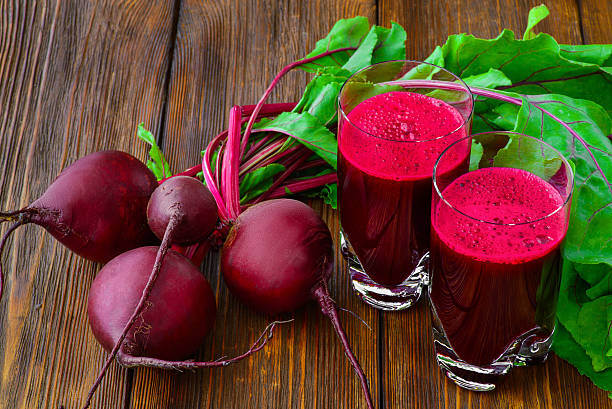Beetroot juice can have these 8 side effects Beetroot juice has been praised as a miracle drink – it boosts stamina, enhances blood circulation, improves digestion, and even makes your skin glow like you’ve just stepped out of a spa. But here’s the twist: drinking it every single day isn’t always sunshine and rainbows. Just like too much sugar can spoil dessert, excessive beetroot juice can actually harm your health in surprising ways.
So before you gulp down that bright red glass thinking it’s liquid health, let’s raise the curtain on the Beetroot Juice Side Effects nobody talks about. Get ready – some of these will shock you, and others might make you laugh nervously, especially if you’ve already had two glasses today
1. Beeturia: The Red Alert in Your Bathroom
Ever gone to the bathroom after drinking beetroot juice and freaked out because your urine or stool turned pinkish-red? Relax, you’re not bleeding internally – it’s just beeturia. This happens because of betacyanin, the pigment that gives beets their signature color. While harmless for most, it can send first-timers into panic mode. Imagine thinking you need a doctor, but all you actually need is to chill because you just drank too much beetroot juice.
Although beeturia itself isn’t dangerous, frequent red urine could confuse you if you’re monitoring for real health issues. If you’re prone to overthinking or have anxiety, this side effect could feel scarier than it actually is. So next time you see the “red alert,” just smile and say, “Oh, that’s my beet juice at work

2. Dangerously Low Blood Pressure
Beetroot juice is rich in nitrates, which the body converts into nitric oxide – a compound that relaxes blood vessels and lowers blood pressure. For people with high BP, this sounds like magic. But here’s the catch: if your blood pressure is already on the lower side, too much beetroot juice could drop it even further.
Symptoms may include dizziness, fainting, headaches, or feeling like your world is spinning after standing up too quickly. Not exactly the energy boost you were hoping for, right? So if you already have low blood pressure, think twice before turning beetroot juice into your daily go-to drink. Sometimes, moderation is the best health hack
3. Kidney Stone Risk
Planning to enjoy beetroot juice every day? Well, your kidneys might not be as happy as you are. Beets contain a high amount of oxalates, which can bind with calcium in the body and form kidney stones over time. Ouch!
If you’ve had kidney stones before, or if they run in your family, chugging down beetroot juice daily is like inviting trouble to knock on your door. Kidney stones are painful, and trust us, you don’t want to deal with that sharp, stabbing discomfort just because you overdid a “healthy” habit.
So keep your beetroot juice intake balanced – a few times a week is fine, but don’t go on a beet binge

4. Digestive Drama: Gas, Bloating, and More
Yes, beetroot juice is rich in fiber and supports digestion, but too much of it can backfire. Overconsumption can cause bloating, stomach cramps, gas, or even diarrhea. Basically, your digestive system throws a mini tantrum.
Fiber works like a broom in your gut, but imagine sweeping nonstop – eventually, it causes chaos instead of order. People with sensitive stomachs may find themselves running to the bathroom or feeling uncomfortably full after drinking large amounts of beet juice.
Funny part? Some people mistake this discomfort for detoxing. Nope, that’s not your body “flushing toxins,” that’s just too much fiber making your gut do backflips
5. Allergic Reactions
Although rare, beetroot can trigger allergic reactions in some people. Symptoms might include rashes, itching, hives, swelling of the lips or tongue, or difficulty breathing. If you notice any of these after sipping beet juice, it’s your body waving a big red flag (pun intended).
Allergies don’t always show up immediately; sometimes they develop after repeated exposure. So if you suddenly feel itchy or notice strange skin reactions after making beetroot juice a habit, consult a doctor. Better safe than sorry
6. Interference with Iron and Calcium Absorption
Here’s an ironic twist: beetroot juice is often consumed to boost iron levels and fight anemia, but too much of it can actually interfere with iron and calcium absorption in the body. Oxalates present in beets can bind to these minerals, preventing your system from using them effectively.
So instead of strengthening your blood and bones, excessive beetroot juice may leave you weaker in the long run. It’s like preparing a feast but locking the dining room door – your body just can’t get to the nutrients.
To avoid this, pair beetroot juice with foods rich in vitamin C, which enhances iron absorption

7. Pregnancy Precautions
Pregnant women are often advised to eat more vegetables, but beetroot juice is one drink to approach with caution. While moderate intake is fine, too much can lead to fatigue, headaches, dizziness, and even digestive discomfort. Nitrates in beets may also affect blood flow, which can complicate things for expecting mothers.
Every pregnancy is unique, so it’s always best for moms-to-be to check with their doctor before making beetroot juice a daily ritual. After all, you don’t want your “superdrink” to turn into a super headache during such a crucial time
8. Timing Matters: When to Drink Beetroot Juice
Even if you love beetroot juice, timing plays a big role in how your body responds to it. Drinking it on an empty stomach may cause digestive issues, while having it late at night could disrupt sleep because of its energizing effects. Experts recommend drinking beet juice in the afternoon to combat fatigue, or in the evening to support detoxification.
Bottom line: beetroot juice isn’t evil – it’s about when and how much you consume. Treat it like a powerful tool, not an everyday unlimited freebie
Don’t Let Beetroot Juice Backfire
Beetroot juice is undeniably nutritious, but it’s not a one-size-fits-all miracle drink. Drinking it in excess can cause beeturia, dangerously low blood pressure, kidney stones, digestive issues, allergic reactions, nutrient absorption problems, and complications during pregnancy.
So the golden rule is: moderation. A glass here and there can give you glowing skin, more stamina, and better circulation. But turning it into your daily obsession may lead to the exact opposite – discomfort and health risks.
Now that you know the real Beetroot Juice Side Effects, you can enjoy your glass wisely. Remember: too much of a good thing is never good
Harvard Liver Expert 4 ways to cure fatty liver
Disclaimer
The tips and suggestions mentioned in this article are intended for general informational purposes only. Before starting any fitness program, making changes to your diet, or trying any remedies related to health conditions, please consult your doctor or a qualified healthcare professional. Dr. You does not verify or endorse the authenticity of any such claims made herein

